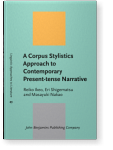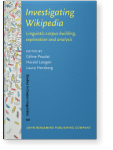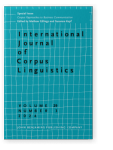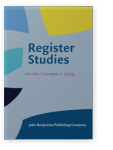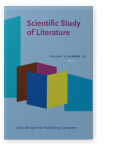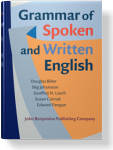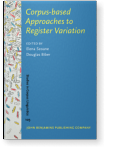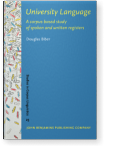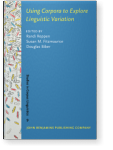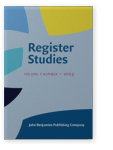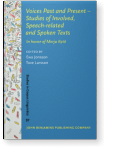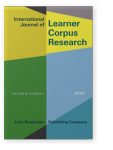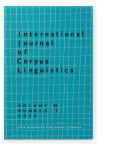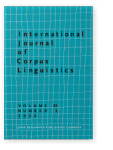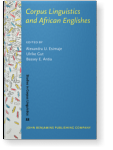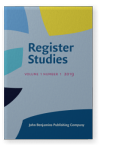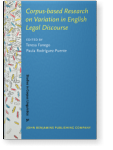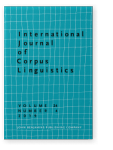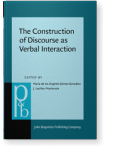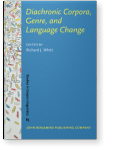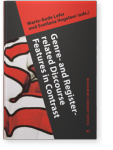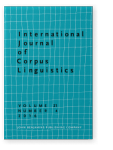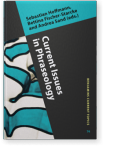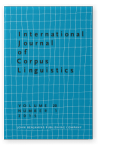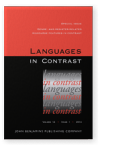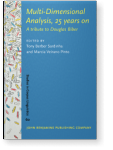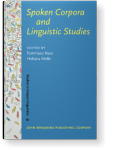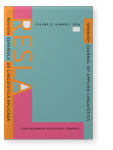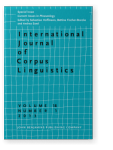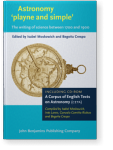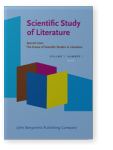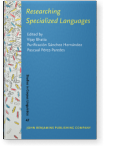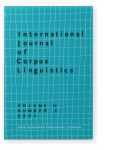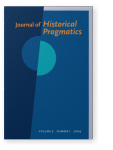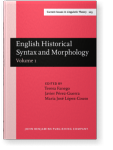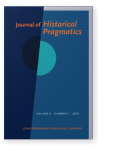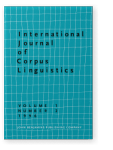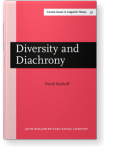Douglas Biber
List of John Benjamins publications for which Douglas Biber plays a role.
Book series
Journals
ISSN 1384-6655 | E-ISSN 1569-9811
Grammar of Spoken and Written English
Douglas Biber, Stig Johansson, Geoffrey N. Leech, Susan Conrad and Edward Finegan
[Not in series, 232] 2021. xxxv, 1220 pp.
Subjects English linguistics | Germanic linguistics | Syntax
Corpus-based Approaches to Register Variation
Edited by Elena Seoane and Douglas Biber
[Studies in Corpus Linguistics, 103] 2021. xi, 341 pp.
Subjects Corpus linguistics | Pragmatics | Sociolinguistics and Dialectology | Theoretical linguistics
Discourse on the Move: Using corpus analysis to describe discourse structure
Douglas Biber, Ulla Connor and Thomas A. Upton
[Studies in Corpus Linguistics, 28] 2007. xii, 289 pp.
Subjects Corpus linguistics | Discourse studies | Pragmatics
University Language: A corpus-based study of spoken and written registers
Douglas Biber
[Studies in Corpus Linguistics, 23] 2006. viii, 261 pp.
Subjects Computational & corpus linguistics | Discourse studies | English linguistics | Germanic linguistics | Pragmatics
Using Corpora to Explore Linguistic Variation
Edited by Randi Reppen, Susan Fitzmaurice and Douglas Biber
[Studies in Corpus Linguistics, 9] 2002. xii, 275 pp.
Subjects Corpus linguistics | English linguistics | Germanic linguistics | Pragmatics | Sociolinguistics and Dialectology
2024 Comparing theory-based models of grammatical complexity in student writing International Journal of Learner Corpus Research: Online-First Articles | Article
The present study tests the empirical adequacy of competing models of grammatical complexity in university student writing, based on analysis of disciplinary texts from L1-English and L2-English students. The results show that grammatical complexity in student writing must be treated as a… read more
2023 What is a register? Accounting for linguistic and situational variation within – and outside of – textual varieties Register Studies 5:1, pp. 1–22 | Editorial
Empirical studies of register variation have established the existence of functional correspondence between situation/context and language use. However, previous conceptualizations of register cannot adequately account for empirical findings which have revealed (i) situational and linguistic… read more
2021 Chapter 2. Extending text-linguistic studies of register variation to a continuous situational space: Case studies from the web and natural conversation Corpus-based Approaches to Register Variation, Seoane, Elena and Douglas Biber (eds.), pp. 19–50 | Chapter
In text-linguistic register research, distributions of linguistic features across registers are theorized as having a functional relationship to the situational context. A strength of this approach is its focus on frequencies of linguistic features across texts/registers. Situational variables,… read more
2021 Chapter 9. On the importance of register in learner writing: A multi-dimensional approach Corpus-based Approaches to Register Variation, Seoane, Elena and Douglas Biber (eds.), pp. 235–258 | Chapter
The present study explores the relative importance of register in learner writing vis-à-vis learner-internal factors such as first-language background. Using multi-dimensional analysis, the study looks at learner and native-speaker student writing from two registers (argumentative essays and… read more
2021 Chapter 1. A corpus-based approach to register variation Corpus-based Approaches to Register Variation, Seoane, Elena and Douglas Biber (eds.), pp. 1–18 | Chapter
2020 Chapter 19. Orality on the searchable web: A comparison of involved web registers and face-to-face conversation Voices Past and Present - Studies of Involved, Speech-related and Spoken Texts: In honor of Merja Kytö, Jonsson, Ewa and Tove Larsson (eds.), pp. 317–336 | Chapter
As Culpeper and Kytö (2010) discuss, one challenge of historical linguistics is the extent to which written texts represent the linguistic characteristics of speech. Synchronic linguists face similar challenges, leading to the practice of using a web corpus to represent the spectrum of… read more
2020 Exploring the longitudinal development of grammatical complexity in the disciplinary writing of L2-English university students International Journal of Learner Corpus Research 6:1, pp. 38–71 | Article
The present paper employs a corpus-based approach to track the longitudinal language development of university students. Compared to many other longitudinal studies, the present study tracks development over a relatively long period of time (two years) for a relatively large group of students… read more
2020 Lexical dispersion and corpus design International Journal of Corpus Linguistics 25:1, pp. 89–115 | Article
Lexical dispersion is typically measured across arbitrary corpus parts of equal size. In this study, we apply DA
– a new dispersion index designed for unequal-sized corpus parts – to the British National Corpus (BNC) in a series of cases studies to show that the dispersion of a word is… read more
2020 Methodological issues in contrastive lexical bundle research: The influence of corpus design on bundle identification International Journal of Corpus Linguistics 25:2, pp. 216–230 | Article
This study explores the influence of corpus design when comparing lexical bundle use across groups, examining how the number of texts and average length of texts can impact conclusions about group differences. The study compares the use of lexical bundles by L1-English versus L2-English writers,… read more
2019 Preface Corpus Linguistics and African Englishes, Esimaje, Alexandra U., Ulrike Gut and Bassey E. Antia (eds.), pp. ix–x | Preface
2019 Text-linguistic approaches to register variation Register Studies 1:1, pp. 42–75 | Article
Douglas Biber, Regents’ Professor of Applied Linguistics at Northern Arizona University, authors this article exploring the connections between register and a text-linguistic approach to language variation. He has spent the last 30 years pursuing a research program that explores the inherent… read more
2019 Chapter 7. Are law reports an ‘agile’ or an ‘uptight’ register? Tracking patterns of historical change in the use of colloquial and complexity features Corpus-based Research on Variation in English Legal Discourse, Fanego, Teresa and Paula Rodríguez-Puente (eds.), pp. 149–170 | Chapter
Language change is a natural evolutionary process, and as a result it is reasonable to expect that all registers will undergo historical change to some extent. While some registers adopt linguistic innovations readily, others resist such changes and exhibit more conservative patterns of change.… read more
2018 Lexis and grammar as complementary discourse systems for expressing stance and evaluation The Construction of Discourse as Verbal Interaction, Gómez González, María de los Ángeles and J. Lachlan Mackenzie (eds.), pp. 201–226 | Chapter
Although ‘stance’ and ‘evaluation’ are closely related theoretical constructs, stance is normally investigated through corpus-based methods focusing on the use of lexico-grammatical features, while evaluative language, being regarded as more context-dependent, has been investigated through the use… read more
2018 Academic writing as a locus of grammatical change: The development of phrasal complexity features Diachronic Corpora, Genre, and Language Change, Whitt, Richard J. (ed.), pp. 117–146 | Chapter
Based on large-scale corpus analysis, this study challenges the notion that academic writing is conservative and resistant to change by documenting linguistic innovations that have emerged in academic writing over the past 200 years. The study explores the dramatic patterns of change that have… read more
2016 Using multi-dimensional analysis to explore cross-linguistic universals of register variation Genre- and Register-related Discourse Features in Contrast, Lefer, Marie-Aude and Svetlana Vogeleer (eds.), pp. 7–34 | Article
Multi-dimensional analyses have been conducted for many different discourse domains and many different languages. Using bottom-up statistical analyses, these studies have investigated specific patterns of register variation in several different discourse domains of English, as well as the more… read more
2016 On the (non)utility of Juilland’s D to measure lexical dispersion in large corpora International Journal of Corpus Linguistics 21:4, pp. 439–464 | Article
This paper explores the effectiveness of Juilland’s D as a measure of vocabulary dispersion in large corpora. Through a series of experiments using the BNC, we explored the influence of three variables: the number of corpus-parts used for the computation of D, the frequency of the target word,… read more
2015 Lexical frames in academic prose and conversation Current Issues in Phraseology, Hoffmann, Sebastian, Bettina Fischer-Starcke and Andrea Sand (eds.), pp. 109–134 | Article
While lexical bundles research identifies continuous sequences (e.g. the end of the, I don’t know if), researchers have also been interested in discontinuous sequences in which words form a ‘frame’ surrounding a variable slot (e.g. I don’t * to, it is * to). To date, most research has focused on a… read more
2015 Evaluating reliability in quantitative vocabulary studies: The influence of corpus design and composition International Journal of Corpus Linguistics 20:1, pp. 30–53 | Article
Recent methodological advances have been used to create word lists based on large corpora. The present paper explores whether these corpora — and the associated lists — are unequivocally more representative. Corpus design considerations have usually focused on issues of external representativeness… read more
2014 Using multi-dimensional analysis to explore cross-linguistic universals of register variation Genre- and register-related discourse features in contrast, Lefer, Marie-Aude and Svetlana Vogeleer (eds.), pp. 7–34 | Article
Multi-Dimensional analyses have been conducted for many different discourse domains and many different languages. Using bottom-up statistical analyses, these studies have investigated specific patterns of register variation in several different discourse domains of English, as well as the more… read more
2014 Opening. Multi-Dimensional analysis: A personal history Multi-Dimensional Analysis, 25 years on: A tribute to Douglas Biber, Berber Sardinha, Tony and Marcia Veirano Pinto (eds.), pp. xxix–xxxviii | Article
This essay takes a personal perspective on the history of Multi-Dimensional (MD) Analysis, including motivations for the first MD studies, the influence of previous seminal research studies, and the influence of faculty colleagues at the University of Southern California. The essay also provides a… read more
2014 Exploring the prosody of stance: Variation in the realization of stance adverbials Spoken Corpora and Linguistic Studies, Raso, Tommaso and Heliana Mello (eds.), pp. 271–294 | Article
Over the last three decades, several studies have applied corpus-analytical techniques to investigate the ways in which ‘stance’ is expressed in spoken and written discourse. Corpus research has shown that there are strong differences among registers in their reliance on the different types of… read more
2014 Lexico-grammatical stance in Spanish news reportage: Socio-political influences on que-complement clauses and adverbials in Ecuadorian broadsheets Revista Española de Lingüística Aplicada/Spanish Journal of Applied Linguistics 27:1, pp. 208–237 | Article
The small South American country of Ecuador has recently come to international attention for perceived threats to journalistic freedom: first a major defamation lawsuit against El Universo (filed in March 2011) for unfounded criticisms of President Correa, and more recently passage of a highly… read more
2013 Lexical frames in academic prose and conversation Current issues in phraseology, Hoffmann, Sebastian, Bettina Fischer-Starcke and Andrea Sand (eds.), pp. 109–136 | Article
While lexical bundles research identifies continuous sequences (e.g. the end of the, I don’t know if), researchers have also been interested in discontinuous sequences in which words form a ‘frame’ surrounding a variable slot (e.g. I don’t * to, it is * to). To date, most research has focused on a… read more
2012 9. The emergence and evolution of the pattern N + PREP + V-ing in historical scientific texts Astronomy ‘playne and simple’: The writing of science between 1700 and 1900, Moskowich, Isabel and Begoña Crespo (eds.), pp. 181–198 | Article
2011 Corpus linguistics and the study of literature: Back to the future? The Future of Scientific Studies in Literature, pp. 15–23 | Article
The present paper introduces corpus-based analytical techniques and surveys some of the specific ways in which corpus analysis has been applied to the study of literature. In recent years, those research efforts have been mostly carried out under the umbrella of ‘corpus stylistics’. Most of these… read more
2011 The historical shift of scientific academic prose in English towards less explicit styles of expression: Writing without Verbs Researching Specialized Languages, Bhatia, Vijay, Purificación Sánchez and Pascual Pérez-Paredes (eds.), pp. 11–24 | Article
The stereotypical view of professional academic writing is that it is grammatically complex, with elaborated structures, and with meaning relations expressed explicitly. In contrast, spoken registers, especially conversation, are believed to have the opposite characteristics. Our goal in the… read more
2009 A corpus-driven approach to formulaic language in English: Multi-word patterns in speech and writing International Journal of Corpus Linguistics 14:3, pp. 275–311 | Article
The present study utilizes a corpus-driven approach to identify the most common multi-word patterns in conversation and academic writing, and to investigate the differing pattern types in the two registers. The paper first surveys the methodological characteristics of corpus-driven research and… read more
2004 Historical patterns for the grammatical marking of stance: A cross-register comparison Journal of Historical Pragmatics 5:1, pp. 107–136 | Article
English has a rich supply of grammatical devices used to express “stance”: epistemic or attitudinal comments on propositional information. The present paper explores historical change in the preferred devices used to mark stance. By examining the entire system of stance devices, the study attempts… read more
2002 Historical shifts in modification patterns with complex noun phrase structures: How long can you go without a verb? English Historical Syntax and Morphology: Selected papers from 11 ICEHL, Santiago de Compostela, 7–11 September 2000, Fanego, Teresa, Javier Pérez-Guerra and María José López-Couso (eds.), pp. 43–66 | Article
2001 Review of Vihla (1999): Medical Writing: Modality in Focus Journal of Historical Pragmatics 2:1, pp. 175–176 | Review
1996 Investigating Language Use Through Corpusbased Analyses of Association Patterns International Journal of Corpus Linguistics 1:2, pp. 171–197 | Article
The present paper argues that analyses of language use provide an important complementary perspective to traditional linguistic descriptions, and that empirical approaches are required for such investigations. Corpus-based techniques are particularly well suited to these research purposes,… read more
1986 Toward a unified model of sociolinguistic prestige Diversity and Diachrony, Sankoff, David, pp. 391–397 | Article
